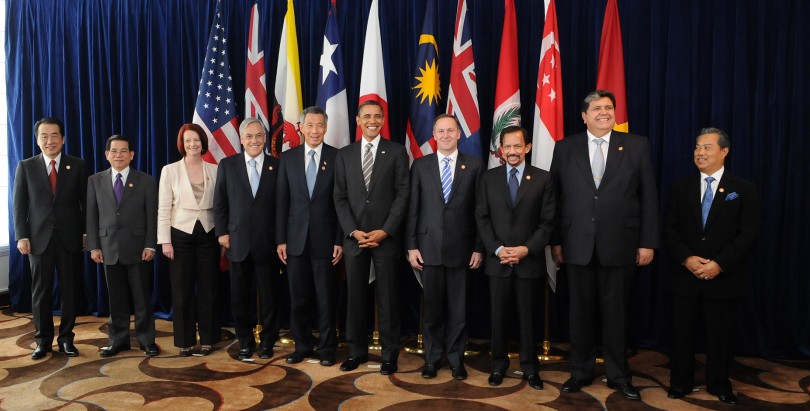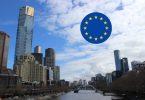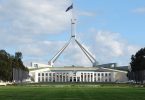by Finbar O’Mallon and Harriet Conron
What is the TPP?
The Trans-Pacific Partnership is a free-trade agreement between 12 Pacific Rim countries including Australia, the US, Canada, New Zealand and several Asian and Latin American nations.
It has been in the making since 2005 under then-Prime Minister John Howard’s LNP government. Successive governments since then, including Howard’s, have opposed various clauses and aspects of the TPP – one reason for the delay.
Right now, negotiations are underway in Maui, Hawaii, and Trade Minister Andrew Robb feels they are days away from a deal. If given the green light, it would include 40 per cent of world trade.
What is an FTA?
Free trade agreements, or FTAs, are designed to make it easier for countries to buy and sell goods between each other by removing tariffs, like import duties. The Australian government signs FTAs to make imported goods cheaper for Australian consumers, and to make our exported goods more competitive overseas. In theory, it’s a ‘win-win’ situation.
UNSW economist Tim Harcourt says FTAs have three main aims:
- Make imported products cheaper for Australian consumers
- Make Australian products cheaper, and therefore more competitive, overseas
- Improve diplomatic relationships with the countries with whom we trade
Why is the TPP a secret? And why the controversy?
The particulars of the TPP – like all free trade agreements – have been kept secret; they are not open to public scrutiny.
Economist Craig Applegate, from the University of Canberra, says this is to ensure the fairness of the negotiations.
“As it is, it’s really hard to get all countries to agree on anything,” he says.
“But if the lobbyists were in there trying to write each clause as it’s being drafted, basically, no agreements would ever happen.”
Basically, in any FTA you have all sorts of industries: sugar, rubber, textiles, metals – the list goes on. Under different sections of FTAs, these industries can win some or lose some. If each of these industries could sit in the room as the clauses were being drafted they could say, “No! You can’t do that! Australian rubber would be finished!” This way, as Applegate says, negotiations would never be fair or finished.
Other people have a different view. Lobbyist-group ‘Get Up!’ has labelled the TPP the “dirtiest deal you’ve never heard of” and activist group Wikileaks have steadily leaked sections of the TPP, much to the frustration of governments and their negotiators.
Separately they argue the TPP could have massive costs on the environment or the health of the signatory countries. But their main concern is the ISDS – or investor state dispute settlements – clauses contained within the TPP.
These clauses would allow big businesses in tobacco, pharmaceuticals and energy to sue the Australian government for its policies. So if the Australian government passed a law banning a certain chemical citing public health interests, the US-based manufacturer of the chemical could sue.
What’s an ISDS?
ISDS stands for investor state dispute settlements, and they are legal clauses which exist in free trade agreements.
When two countries sign an FTA with an ISDS clause in it, companies from either of those countries can sue the government in the other country if they feel their investment has been harmed by that government’s action.
During the 1960s, governments in Africa and South America were busy nationalising resources and utilities – like coal mines. Some private companies had invested in the coal mines and would therefore be losing out if the government seized their asset. So, under an ISDS clause, the company could get back money lost from their investment. This was known as direct expropriation.
But what’s controversial about the ISDS clause is companies are frequently citing indirect expropriation. The government hasn’t directly seized a company’s asset, but through policy has financially harmed the company’s operation.
For example, there’s the North American Free Trade Agreement, aka NAFTA. It was a big free trade agreement signed between the US, Canada and Mexico. When the Canadian government started banning certain chemicals over fears of their environment and health costs, US-based chemical companies sued the Canadian government under the ISDS clause due to indirect expropriation.
In other words, a democratically elected government has tried to protect its citizens and a private company has sued them for it. This prompts governments to start taking its cues from companies and not its citizenry.
Since negotiations over the TPP began more than 10 years ago, the US has been heavily pushing for an ISDS clause. Even then, the Howard government pushed back and when Labor came into power they categorically ruled out allowing ISDS clauses in any FTAs. However, the Abbott government in its FTAs with Korea, Japan and most recently China, have allowed ISDS clauses.
While Robb hasn’t ruled ISDS clauses in or out, the government’s recent history perhaps indicate its willingness to include the clauses if it means ratifying an FTA. This is despite the concerns of the Howard, Rudd and Gillard governments.
Is Australia involved in any ISDS battles?
Right now, Australia is locked in a legal battle with cigarette-company Phillip Morris Asia at an ISDS tribunal. Under a 1993 Hong Kong/Australia free trade agreement, Hong Kong-based Phillip Morris Asia is suing the Australian government over its plain-packaging laws. By introducing plain-packaging and not allowing Phillip Morris to use its own branded packaging, the company argues Australia has seized its intellectual property.
So far, this legal battle has cost the Australian government $50 million and it is still a long way from being settled. In the most recent federal budget, the government wrote a blank cheque for ISDS-related litigation.
At the same time it is throwing money at this lawsuit, the Abbott government has been signing off on a spate of FTAs which contain ISDS clauses.
There are concerns on how the TPP will affect drug patents in Australia.
The TPP’s intellectual property provisions could also make medicines more expensive for Australians. A recently leaked chapter revealed patent protections for pharmaceutical drugs could be extended up to eight years. This means big American pharmaceutical companies would have an eight-year long monopoly on making some medications.
Deborah Gleeson on Twitter: “Many lives hang in the balance as #TPP ministerial meeting starts tomorrow in Hawaii. #TPPA #publichealth #auspol #sdoh / Twitter”
Many lives hang in the balance as #TPP ministerial meeting starts tomorrow in Hawaii. #TPPA #publichealth #auspol #sdoh
Currently, when patents expire Australia can import significantly cheaper generic-brand medicines from Asia. Under the TPP’s patent protections, we wouldn’t be able to do this, and the cost of making drugs affordable under the Pharmaceutical Benefits Scheme would increase. This means taxpayers would be chipping in more to subsidise patent-protected medicines.
Where to from here?
The TPP is still under secret negotiation in Hawaii, but even once all the countries sign, it isn’t a done deal. The agreement has to be ratified by each state, and the countries all have their own mechanism for doing this. In Australia we treat trade agreements like a ‘locked-down’ piece of legislation, so federal parliament has the opportunity to refuse the TPP. But it can’t redraft it, so this means it will probably come down to the whether the opposition supports the government in the Senate. This all-or-nothing approach also applies in the USA, where Congress has the power to reject the agreement, but can’t change its wording.
University of Canberra economist Craig Applegate says this goes some of the way to rebuff fears that citizens will have this trade agreement shoved down their throats. “If people decide overall that it’s a crappy agreement, then they can choose not to ratify it,” he says.








[…] Trans-pacific partnership (TPP) is coming close to a final deal, but serious disagreements over intellectual property of […]